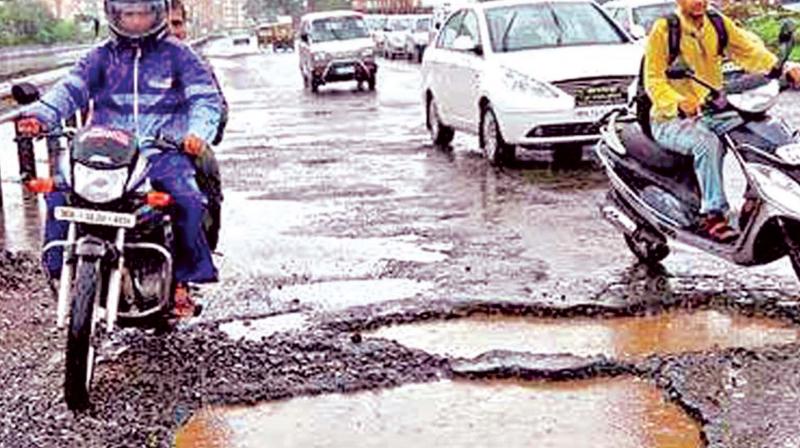By Invitation: From Bangalored to potholed.. the fall of tech city
However, the new Bengaluru city did not have such a council and an essential planning mechanism for it was destroyed.

Time was when the world was ‘Bangalore-d!’ with the city providing hi- tech services at a cost differential that made other parts of the world redundant. But today all that talk of Bengaluru being hi-tech and the Silicon Valley of India falls flat when you visit it as it has become ‘potholed.’
A Bengalurean now needs to play a real life game of circumventing potholes and little hillocks that appear suddenly on the roads, likened to travelling on the moon’s surface in a recent video that went viral. This game requires lightning responses, the lack of which, unlike in a video game, can result in real deaths, estimated at about 50 every year, and leave many injured.
Unlike other metros, Bengaluru was a pleasant town that suddenly grew into a city and then into an unlivable metropolis in just a few decades through unchecked and unplanned growth. Therein lies it’s misfortune. It did not have an urban management culture and nor did it have the institutional depth, besides that key ingredient that makes a city click: governance.
But what certainly cannot be forgiven is the lack of vision of its politicians and bureaucrats, who keep beating a dead horse. It is common sense that if something doesn’t work, we must try something else. However, Bengaluru has doggedly pursued its flawed administrative framework, leading to mis-governance at every level, that ultimately shows up as potholes that refuse to go away. Potholes are not the disease, but symptoms of a lack of a sound governance.
When Bengaluru was made the new state capital, something went badly wrong. Back in the days when it was ruled by Mysuru, there apparently existed a better planning mechanism. It had a ‘Metropolitan Transport Council,’ which in the fifties and sixties was so futuristic that it was planning an underground as well as a circular railway for the city (better than our present metro)!
However, the new Bengaluru city did not have such a council and an essential planning mechanism for it was destroyed. To make matters worse, the ministers, who sit in Bengaluru, want to rule it like some colonial masters, interfering in everything. And to blame is the allure of the large budgets for the city.
In the nineties, the Indian Parliament enacted the 74th Amendment, providing for the involvement of a Metropolitan Planning Committee and local urban bodies and ward committees with citizen participation in master planning for the city, in a bottom- up process, to make it representative and real.
Also, in the nineties, the ministry of urban affairs came out with a model Unified Metropolitan Transport Authority (UMTA) bill to fix the greatest challenge to our cities, which is mobility. It was acknowledged that the lack of a single authority to manage a city’s transport assets and modes delivers a broken and inefficient mobility ecosystem.
In our city, while the BBMP owns the roads and the traffic department is aware of the potholes, nobody fixes them. It is indicative of a failed system. What will it take to have a unified transport authority that owns the roads, has its own policing arm, imposes fines, regulates , repairs and maintains them and is accountable too?
When it comes to larger infrastructure such as road networks, suburban rail, the metro, bus services, inter-connectivity and the other needs of the city such as trees, ecology, lakes, and storm water drains, why is there such a disconnect? Due to decades of abuse, the city now has to deal with extreme climatic events and depleted ground water. The writing is then on the wall : if we don’t get our act together and make the city resilient, we could be looking at a looming catastrophe.
The city administration requires desperate rationalisation and reform. The BBMP should be made truly democratic and empowered to manage the city with a full term mayor and all parastatals merged into it. We need to adopt the 74th Amendment and the UMTA bill with some improvements and the state government should be barred from interfering in the city’s affairs. Only then will Bengaluru have a hope of becoming livable and manageable again.
The problem lies in poor planning and coordination and poor choices, resulting from ignoring the voice of the people. We can change all that and return our city to its past glory.
The day we are free of potholes, we will know that the problems have been resolved and the disease cured.

